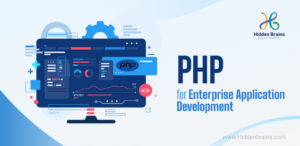Summary
This blog discusses enterprise application development using PHP, showcasing why PHP remains a reliable choice for large-scale business systems. It highlights PHP’s strengths, such as flexibility, strong frameworks, extensive libraries, and solid community support that make it ideal for building robust, secure, and scalable enterprise solutions. The guide also covers best practices for architecting PHP applications, integration capabilities, and how PHP supports evolving business requirements, helping organisations deliver high-quality enterprise applications with speed and efficiency.
Blog summary– In enterprise application development, maximizing efficiency and scalability is crucial. PHP is a popular programming language that can help achieve these goals. Its flexibility and vast array of frameworks and tools make it an ideal choice for building robust and scalable applications. This blog will explore how PHP can be used to develop enterprise applications that are efficient and easily scalable.
Let’s Begin!
PHP powers nearly 78.9% of existing websites today, indicating that this scripting language is the king of server-side development. On the other hand, around 4755 companies from a global spectrum prefer to use PHP for their Enterprise Application Development ecosystem. And it is worth mentioning that it includes brands like Lyft, Facebook, Slack, and whatnot.
These numbers and stats are enough for anyone to gape and wonder what does this language consist of that makes it an ideal choice for enterprises? To explain a bit to you, this open-source language has not sat on its laurels, rather kept on improving its functionalities with each version release. In simpler terms, it has kept pace with ongoing technological evolution with Elan. There are not just one but multiple reasons that support its popularity, which are discussed in detail in this post.
PHP for Enterprises- Fuelling a Tech Revolution
PHP also known as Hypertext Preprocessor, is redefining the future of enterprise app development.
To give you a quick synopsis, this server-side scripting language created a thriving entrance in the world over 2 decades ago (in 1994) and has since undergone constant development and improvement through its thriving developer community.
Indeed, its popularity and wide usage can be attributed to its ability to seamlessly integrate with HTML, produce dynamic web pages, with extensive support for databases.
Enterprise Software- Leading the Way to the Future
Enterprise application software has become ubiquitous in today’s business world. Companies of all sizes rely on a variety of software to help them manage their operations and stay competitive. Whether it’s content management, communication and collaboration, CRM, or ERP, each piece of software plays a vital role in ensuring a company’s success.
However, there is a catch!
Enterprise applications are developed with a specific purpose in mind – to streamline the procedures of the organization from within.
Unlike other apps, which are developed for end users, enterprise applications are designed to cater to the needs of the organization itself. These apps are built to solve critical business problems, and as such, they are much more complex than traditional mobile apps.
Here, you should not forget that every business has different needs that cannot be fulfilled by off-shelf software. Custom software development allows businesses to customize their websites or applications according to their specific needs.
Moreover, it enables enterprises to integrate their existing systems with the software seamlessly.
How Does PHP Provide a Breakthrough for Enterprises?
Enterprises are looking forward to creating a strong digital footprint in today’s competitive world. Henceforth, businesses cannot afford to have a subpar online presence. As such, it has become increasingly important for enterprises to have a web application that delivers a rich user experience.
Not only does this lead to a lower bounce rate, but it also attracts more end users, ultimately leading to increased revenue. To achieve this goal, businesses often require a full-fledged web application that has all the latest features and functionalities.
And this is where PHP comes into play!
PHP is one of the most versatile languages out there when it comes to creating web apps and software.
Its popularity stems from its ability to handle both simple and complex projects with ease.
From creating a primary blog to managing a large online store, PHP has the power to do it all.
PHP Frameworks for Enterprise Applications
When it comes to choosing a PHP framework for a web application, there are a variety of options to consider. Different frameworks offer different levels of functionality, features, and performance depending on the specific needs of the application.
Some of the most popular options include Laravel, Symfony, and CodeIgniter, each with its own strengths and weaknesses.
But having a LARGE pool of frameworks only leads to confusion.
Fret not!
Let us help you make a quick comparison of PHP frameworks, so you can make an informed decision without falling for a random choice.
Also read- Popular Frontend Frameworks
A Quick Comparison Guide to Popular PHP Frameworks
When it comes to developing enterprise web applications, choosing the right PHP framework can make or break a project. So let’s find out the most significant differences between top-notch PHP frameworks.
Laravel
Laravel is one of the most popular PHP frameworks in the world. It was first released in 2011 and since then, it has gained a reputation for being a powerful tool for building web applications. Developed by Taylor Otwell, Laravel is known for its elegant syntax, excellent documentation, and strong community support. As a result, it has become the go-to framework for many developers who want to create web applications quickly and efficiently.
Key Benefits of Laravel
- Laravel Homestead is an official, pre-packaged Vagrant box offering a wonderful development environment without requiring to installation of PHP.
- Laravel Valet supports Symfony, CakePHP 3, Slim, and Zend, as well as WordPress.
- Packalyst, a collection of Laravel packages, has more than 15,000 packages to be used in projects.
- Provides a range of security features and methods.
- Expedites development by allowing developers to automate repetitive tasks and generate skeleton code fast.
- It has several useful tools such as Mix for compiling CSS and JS assets, and Socialite for OAuth authentication.
Symfony
Symfony is a popular PHP framework used for web application development. It is known for its robustness and flexibility in creating web applications of any size. Its extensive library of components allows developers to easily integrate popular features into their applications, such as authentication and routing. Its clear and concise documentation results in a short learning curve, making it an excellent choice for both small and large-scale projects.
Key benefits of Symphony
- An excellent choice for websites and apps that need to be scalable.
- Its modular component system is very flexible.
- Supports most databases out of the popular PHP frameworks.
- Debugging Symfony projects is straightforward with the in-built toolbar.
- Has commercial backing from Sensio Labs.
- Huge community with over 600,000 developers actively involved.
CodeIgniter
CodeIgniter is a PHP framework that is known for allowing web developers to build web applications quickly and easily. With its minimal configuration, developers can start working on their projects almost instantly.
Key Benefits of Codeigniter
- Provides essential libraries and helpers.
- Allows writing code more efficiently and shortens development time.
- Scalable and flexible, making it suitable for small startups as well as large enterprise applications.
- Includes defenses against CSRF and XSS attacks, plus context-sensitive escaping and a Content Security Policy.
Zend Framework
The Zend Framework was introduced in 2006 as a PHP framework for building web applications. It quickly gained popularity due to its modular architecture and strong community support. However, with the changing needs of modern web development, the framework began to show its age. That’s where the Laminas Project comes in – a rebranded version of Zend Framework that aims to modernize the codebase while retaining the proven reliability of its predecessor.
Key Benefits of the Zend/Laminas Project:
- Has more than 570 million installations.
- Code can be ported across to other frameworks without difficulty.
- The community has a forum and Slack group for collaboration and support.
Want to Build Agile and Scalable Enterprise Apps with PHP?
Top Considerations to Choose the Right Framework for Your ERP
When it comes to building successful web applications, choosing the right framework is essential, but it’s not enough on its own.
Even if you’ve found a framework with excellent capabilities and a fast learning curve, long-term success will depend on how effectively you can use that framework to meet the needs of your users.
This means not only staying up-to-date with the latest best practices and industry trends, but also taking the time to understand your users’ needs and preferences, and tailoring your application to meet those needs.
Best Practices to Optimize the PHP Framework
To get the most out of a PHP framework, and avoid frustration, make sure that you have a decent knowledge of PHP and understand the underlying concepts behind frameworks: MVC architecture, object-oriented syntax, databases and ORMs, and the command line.
With this knowledge in hand, it becomes much easier to choose a PHP framework that will meet your project’s needs. Additionally, having a solid understanding of these concepts will help you to utilize the framework more effectively and to troubleshoot issues that arise.
When looking for a framework, it’s important to take into account the support and documentation available, as these can greatly impact the success of your project. Some of the best practices to optimize PHP frameworks include:
Easy Learning Curve
If you are new to PHP frameworks, you may feel intimidated by the abundance of choices. However, the learning curve for a beginner should be manageable. Once you gain a basic understanding of the framework’s concepts and syntax, you can begin to adapt it to your needs.
Starting with a well-documented framework and a helpful community can ease the process of getting comfortable with the framework.
Saves Time
Not all frameworks are created equal. It is important to choose a framework that is not only easy to use but also saves time in the long run.
Integrating a well-designed framework can help streamline the development process and increase productivity, which can ultimately lead to a better final product.
Technical Compatibility
With a multitude of options available, developers need to be cautious while selecting one that fits their project requirements.
Choosing a framework that supports database integration and compatibility with deployment options is extremely relevant. It is imperative to select a framework that is stable and is backed by a strong community for better support and maintenance.
Feature-Rich Framework
Web development has seen some revolutionary changes in recent years, especially in the frameworks being used. When it comes to choosing a framework, it’s important to consider the features it offers.
It’s vital to find the right balance of functionality and simplicity that will fit the needs of the project.
Documentation and Support
Having easy access to clear and concise documentation can speed up development time and ensure that the framework is being used to its full potential.
In addition, a comprehensive support network can provide assistance and answers to questions throughout the development process.
It’s important to consider the availability of documentation and support when evaluating different PHP frameworks, as it can greatly impact the success of the project.
Security is a Must for PHP Apps
PHP is widely used to create websites, making it a popular target for hackers. The risks associated with PHP vulnerabilities lie in the fact that cyber attackers can use these vulnerabilities against millions of websites, an alarming fact that every site owner needs to consider.
Without proper security measures in place, such vulnerabilities can lead to sensitive information being exposed or worse, a complete site takeover by malicious actors.
Hence, it is important to keep your PHP applications up-to-date and implement security best practices to protect your website and its visitors.
In order to prevent cyber attacks, it is important to take proactive measures and learn about proven security practices for PHP. By incorporating these practices, developers can ensure the safety and security of their applications, as well as their users’ data.
Therefore, it is significant when you Hire PHP Developers, they must familiarize themselves with these practices and implement them in their code.
Top Security Strategies to Secure Your PHP Application
Prepared SQL Statements
One major vulnerability that site owners need to be aware of is SQL injection attacks, which occur when malicious code is inserted into a website’s SQL statements.
To protect against these threats, it is crucial to implement robust security measures that include measures to escape all inputted values to databases, which ensures the safe execution of SQL statements.
CSRF Attacks
Cross-site request forgery (CSRF) is a dangerous attack vector that has been increasingly utilized by hackers. It involves an attacker exploiting the trust between a user and a website to perform unwanted actions.
Essentially, the attacker tricks the user into performing actions they didn’t intend to do, all while they believe they’re interacting with a legitimate website.
The SameSite cookie attribute is a powerful tool for preventing unauthorized access to websites. With this attribute, website administrators can instruct web browsers to only send cookies when users navigate to the site directly.
This can help prevent cross-site request forgery attacks, which are common technique used by hackers to gain access to sensitive information.
Bind IP Address With Session ID
Session hijacking is a serious security threat that affects web applications, particularly those that rely on sessions to store user data. By secretly stealing a visitor’s session ID, hackers can gain unauthorized access to sensitive information, such as login credentials or personal data.
This type of attack is particularly problematic because it can be difficult to detect by traditional security measures like firewalls and antivirus software.
To prevent this, it is important to bind the session ID to other user or client properties. This makes it harder for attackers to hijack the session, as they would need access to all the properties used in the binding mechanism.
XSS Attacks
An XSS (Cross-Site Scripting) attack is a common vulnerability that can occur when a website accepts user input and outputs it directly to the webpage.
Hackers can exploit this vulnerability by submitting malicious code, such as JavaScript, HTML, or even CSS, to the website.
However, developers can protect against this frequent XSS attack by sanitizing the data that is received by the website.
Ubiquitous Benefits for Enterprises by Using PHP Applications
Simplified Product Management
To stay competitive, e-commerce business portals can utilize the power of PHP to offer a wide range of features, including discounted prices, calculated shipping costs, and streamlined sales tax collection. By harnessing the power of modern technology, businesses can improve customer satisfaction, increase profits, and streamline their operations.
High-Security
Having a PHP-built website not only provides a user-friendly interface to customers but it also ensures top-notch security to prevent vital data against hackers. The security features in PHP are constantly updated and maintained, making it a reliable option for businesses of all sizes to be used by PHP Development Company.
Faster Development
When it comes to developing a website for a business, there are several factors to consider such as the size of the website and the available budget. However, with PHP as a foundation, a business website can be created quickly and efficiently without breaking the bank. One of the benefits of using PHP is that it is an open-source language, which means it is free for developers to use and modify. This makes it an ideal choice for small businesses looking to build their online presence without spending a lot of money.
How Does PHP Reduce Total Development Cost?
The use of a PHP framework for app development has been proven to be a cost-effective solution, resulting in faster development and lower costs for the entire project.
- A large pool of PHP developers is familiar with many additional web technologies that might be required for a complete build, such as HTML, CSS, JavaScript, and others. This makes PHP a versatile tool for building dynamic and interactive websites and web applications.
- PHP offers pre-built modules range from authentication and database management to encryption and XML parsing. The seamless integration of these modules can significantly reduce development time and effort.
- Compared to other languages like Java, PHP Web Application Development Services provide instant output without requiring compilation, which can save time and streamline the development process. This ability to quickly see results can be beneficial when working on large projects, allowing developers to identify and fix issues more efficiently.
Final Verdict
PHP has emerged as one of the most sought-after web development frameworks because of its robust and secure architecture. Its platform-independent nature allows for greater flexibility in deploying features across different devices.
The appeal of PHP lies in its ability to write less code while still achieving the desired functionality, and it boasts a large and supportive community of developers.
These reasons make PHP the ideal choice for creating a classic website that can stand the test of time.
Ready to Maximize Efficiency with PHP for Enterprise Apps?
Quick Recap- Why Enterprises Must Soak in the Aura of PHP
When it comes to enterprise-level applications, PHP stands out as the top choice for developers. Its flexibility, robustness, and scalability make it a go-to platform for building secure and efficient software that meets the demands of businesses today. Whether it’s e-commerce, customer management or data analysis, PHP provides a solid foundation for developing web applications that are tailored to meet the diverse needs of varying industries.
- PHP is known for its flexibility, which makes it easy for developers to make changes to their code.
- PHP can also be used to create large and complex systems that handle huge transactional loads.
- PHP Development has massive libraries and so many packages for easy integration with many platforms. Developers can use these libraries and packages to quickly create efficient and reliable applications.
- PHP has emerged as one of the most popular platforms due to its flexibility and simplicity. Due to the high demand for PHP developers, finding skilled professionals in this field has become relatively easy.
- Owing to its ability to reuse development code, PHP has become a sought-after option for businesses and developers looking to optimize their code.
The Bottom Line
PHP technology has gained a widespread reputation in web development over the past few years, owing to its simplicity, and user-friendliness.
It has gained a great deal of traction for its scalability, which makes it an ideal choice for businesses wanting to grow their online presence.
As an experienced PHP development company, we at Hidden Brains believe in working closely with our clients to understand their unique requirements. Our team of experts collaborates with clients to create a detailed list of specifications for the project to ensure the most accurate and efficient work possible.
By taking the time to understand our client’s visions and goals, we are able to deliver outstanding results that exceed their expectations.
At Hidden Brains, we are committed to providing exceptional PHP Application Development Services that help our clients achieve their business objectives.
Give us a call to experience the difference!
Frequently Asked Questions
What makes PHP suitable for enterprise app development?
PHP offers flexibility, strong frameworks, easy integration, and a large developer community for scalable solutions.
Which PHP frameworks are best for enterprise projects?
Laravel, Symfony, and Zend are popular enterprise-grade frameworks with robust features and security.
Can PHP handle large-scale enterprise applications?
With optimized architecture and best practices, PHP supports high load, complex workflows, and enterprise needs.
Is PHP secure for enterprise solutions?
Yes, when using secure coding practices, proper validation, and framework protections, PHP delivers strong security.
How does PHP integration benefit enterprise systems?
PHP easily integrates with third-party APIs, databases, services, and legacy systems for seamless workflows.
Conclusion
Enterprise application development with PHP remains a powerful and flexible choice for building robust, scalable business solutions. Its extensive framework ecosystem, strong community support, and ease of integration make it ideal for handling complex enterprise requirements. With proper architecture and skilled developers, PHP applications deliver performance, security, and maintainability. Whether you’re modernizing existing systems or launching new enterprise modules, choosing the right PHP strategy ensures faster development and business growth. Partner with experienced PHP developers to achieve tailored, high-quality enterprise solutions.































































































![Sales & Distribution [Oil & Gas] Sales & Distribution [Oil & Gas]](https://www.hiddenbrains.com/blog/wp-content/themes/blankslate/assets/images/sales_and_distribution-icon.74d08193.svg)

![Fluid Terminal Management [Oil & Gas] Fluid Terminal Management [Oil & Gas]](https://www.hiddenbrains.com/blog/wp-content/themes/blankslate/assets/images/fluid_terminal_management-icon.4b3a27a4.svg)































![Sales & Distribution [Oil & Gas] Sales & Distribution [Oil & Gas]](https://www.hiddenbrains.com/blog/wp-content/themes/blankslate/assets/images/sales_and_distribution-icon.74d08193.svg?1.0.0)
![Fluid Terminal Management [Oil & Gas] Fluid Terminal Management [Oil & Gas]](https://www.hiddenbrains.com/blog/wp-content/themes/blankslate/assets/images/fluid_terminal_management-icon.4b3a27a4.svg?1.0.0)




























































































































































































